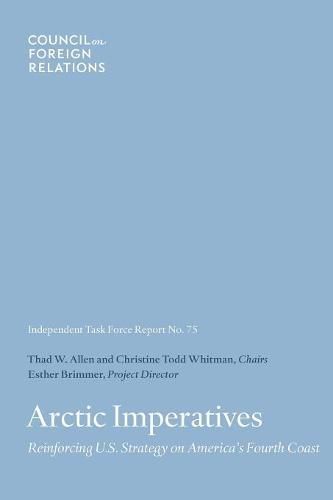Readings Newsletter
Become a Readings Member to make your shopping experience even easier.
Sign in or sign up for free!
You’re not far away from qualifying for FREE standard shipping within Australia
You’ve qualified for FREE standard shipping within Australia
The cart is loading…






The United States, through Alaska, is a significant Arctic nation with strategic, economic, and scientific interests, asserts a new Council on Foreign Relations-sponsored (CFR) Independent Task Force report, Arctic Imperatives: Reinforcing U.S. Strategy on America’s Fourth Coast. With the Arctic warming at twice the rate as the rest of the planet and melting sea ice opening up this resource-rich region to new trade routes and commercial activities, the report stresses that the United States needs to increase its strategic commitment to the region or risk leaving its interests unprotected.
Chaired by Thad Allen, retired admiral and former commandant of the U.S. Coast Guard, and Christine Todd Whitman, former administrator of the Environmental Protection Agency and governor of New Jersey, the Task Force finds that the United States lags behind other Arctic nations that have updated their strategic and commercial calculations to take advantage of the changing conditions stemming from the opening of the region.
The report notes that while Russia has numerous ice-breaking vessels and China is building a third icebreaker, the United States owns only two operational ice-breaking ships–one heavy icebreaker and one medium-weight icebreaker–to serve both the Arctic and the Antarctic. Asserting that icebreakers are a national capacity required for a range of maritime missions to support U.S. security, economic, and commercial needs, the Task Force recommends that the United States fund and build additional icebreakers.
The report also finds that the United States needs greater investment in Alaskan infrastructure, including deepwater ports, roads, and reliable telecommunications, to support economic development and a sustained security presence in the region. Currently, almost no marine infrastructure is in place within the U.S. maritime Arctic.
The bipartisan Task Force is composed of twenty experts from diverse backgrounds. The project is directed by Esther Brimmer, executive director and chief executive officer of NAFSA: Association of International Educators, and a recent CFR adjunct senior fellow for international institutions.
$9.00 standard shipping within Australia
FREE standard shipping within Australia for orders over $100.00
Express & International shipping calculated at checkout
The United States, through Alaska, is a significant Arctic nation with strategic, economic, and scientific interests, asserts a new Council on Foreign Relations-sponsored (CFR) Independent Task Force report, Arctic Imperatives: Reinforcing U.S. Strategy on America’s Fourth Coast. With the Arctic warming at twice the rate as the rest of the planet and melting sea ice opening up this resource-rich region to new trade routes and commercial activities, the report stresses that the United States needs to increase its strategic commitment to the region or risk leaving its interests unprotected.
Chaired by Thad Allen, retired admiral and former commandant of the U.S. Coast Guard, and Christine Todd Whitman, former administrator of the Environmental Protection Agency and governor of New Jersey, the Task Force finds that the United States lags behind other Arctic nations that have updated their strategic and commercial calculations to take advantage of the changing conditions stemming from the opening of the region.
The report notes that while Russia has numerous ice-breaking vessels and China is building a third icebreaker, the United States owns only two operational ice-breaking ships–one heavy icebreaker and one medium-weight icebreaker–to serve both the Arctic and the Antarctic. Asserting that icebreakers are a national capacity required for a range of maritime missions to support U.S. security, economic, and commercial needs, the Task Force recommends that the United States fund and build additional icebreakers.
The report also finds that the United States needs greater investment in Alaskan infrastructure, including deepwater ports, roads, and reliable telecommunications, to support economic development and a sustained security presence in the region. Currently, almost no marine infrastructure is in place within the U.S. maritime Arctic.
The bipartisan Task Force is composed of twenty experts from diverse backgrounds. The project is directed by Esther Brimmer, executive director and chief executive officer of NAFSA: Association of International Educators, and a recent CFR adjunct senior fellow for international institutions.